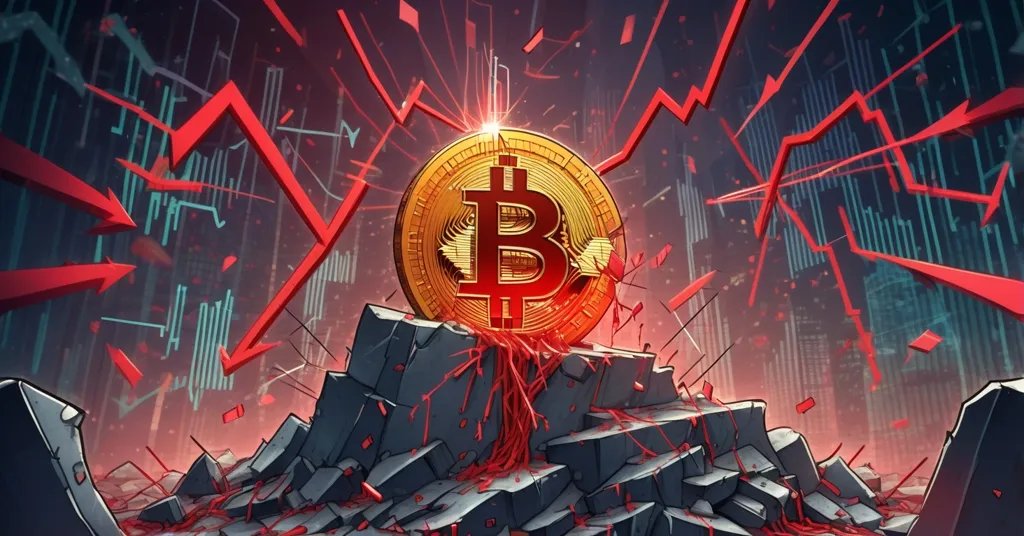China’s Stock Market Crashes: Can Bitcoin Save Savers from Financial Ruin?

China’s Stock Market Collapse: Is Bitcoin the Escape Hatch for Savers?
China’s stock market is a disaster zone, trapped in a decade-long slump that’s crushed investor confidence and turned households into cash hoarders, while leaders like Xi Jinping and even external figures like Donald Trump wrestle with how to spark spending in an $11 trillion financial quagmire. Could Bitcoin and decentralized finance (DeFi) offer a way out for a population burned by centralized failures?
- Market Failure: The CSI 300 index, tracking China’s top 300 companies, turned a $10,000 investment into just $13,000 over 10 years, compared to over $30,000 in the U.S. S&P 500.
- Cultural Distrust: A household saving rate of 35-44% reflects deep skepticism in equities, fueled by systemic flaws and weak investor protections.
- Crypto Lifeline: Bitcoin and DeFi could provide a decentralized alternative to preserve wealth, though regulatory bans and volatility are massive hurdles.
A Market Built to Fail
Let’s not sugarcoat it: China’s stock market is a rigged game. The CSI 300, akin to the U.S. Dow Jones as a benchmark for major firms, has clawed back less than 7% in 2024 despite some flashy weekly gains of up to 12.4%—still languishing at post-crash levels from a decade ago. Data paints a grim picture: while a $10,000 stake in the S&P 500 tripled over ten years, the same in the CSI 300 barely limped to $13,000. Established 35 years ago, the Shanghai and Shenzhen exchanges were never about enriching the average Joe—they were state tools to bankroll government projects. The fallout? Flooded share sales, post-IPO shenanigans, and investor protections that are more myth than reality.
Take Beijing Zuojiang Technology as a textbook screw-up. Listed in 2019 with hype around a product mimicking Nvidia’s tech, it crashed into delisting by 2024 after a disclosure probe exposed its empty promises. It’s not a one-off; it’s the norm in a system where, as asset manager Chen Long puts it:
“Many ordinary people come in thinking they could make money, but the majority of them end up poorer.”
He doubles down on the root cause:
“State-owned companies primarily answer to the government rather than shareholders, while many private entrepreneurs have little regard for small investors.”
Cultural Fallout: Hoarding Over Investing
This isn’t just about lousy returns; it’s a societal gut punch. Chinese households, with a saving rate hovering between 35% and 44% depending on the metric, are stuffing cash in mattresses rather than betting on a market that’s repeatedly screwed them. Unlike Western investors often guided by fundamentals, Chinese savers react to sentiment—swayed by government signals like Politburo statements or sudden rate cuts. A crumbling property sector and a threadbare social safety net only crank up the risk aversion. Why gamble when the house always wins, and the house is Beijing?
Xi Jinping is sweating to hit a 5% growth target, banking on consumption to fuel the economy while juggling a tariff war with the U.S. that’s strangling exports. Yet, he’s also pushing equity financing to prop up tech firms with shaky balance sheets—a dicey bet at best. Recent Politburo moves to “stabilize housing and stock markets” sound promising, but as Hao Hong, chief investment officer at Lotus Asset Management Ltd., warns:
“Except for a stock market rebound, [confidence is hard to restore quickly].”
Lian Ping, chairman of the China Chief Economist Forum, cuts deeper into the bias:
“The exchanges are motivated to fulfill the government’s call for increasing companies’ financing, but when it comes to protecting investors’ interests, there are few who are motivated to do it.”
For a deeper look at the struggles to boost spending, check out this analysis of Xi and Trump’s efforts to push China’s economy.
Reforms: Too Little, Too Late?
Beijing isn’t blind to the mess. Recent regulatory overhauls are trying to patch the leaks—tighter IPO screenings slashed 2023 listings to a third of the prior year’s flood, fraud enforcement is tougher, share issuance is curbed, and dividend payouts hit 2.4 trillion yuan ($334 billion) in 2024, up 9% from last year. Ding Wenjie, an investment strategist at China Asset Management Co., sees a silver lining:
“The regulations and overall requirements after IPO have become stricter, in terms of reliability, transparency, or information disclosure.”
But let’s not kid ourselves. Even if short-term spikes happen—and some 2024 weeks flashed promise—history screams caution. The 2014-2015 CSI 300 bubble saw the index nearly double before imploding. A quick rally won’t erase decades of distrust; it might just inflate another pop waiting to happen. For historical context, see this overview of the Chinese stock market crash, and for recent regulatory changes, explore the latest updates on IPO screening and fraud enforcement.
Bitcoin as a Lifeline: Freedom from Centralized Rot
If centralized systems are the disease, could decentralization be the cure? Enter Bitcoin, a digital currency powered by a peer-to-peer network, secured by cryptography, with a hard cap of 21 million coins. No state or suits can inflate it away or seize it on a whim—unlike the CSI 300, where your wealth is hostage to bureaucratic agendas. For Chinese savers scarred by market “land mines,” Bitcoin offers a potential fortress for value, a hedge against a system that’s failed them. It’s not mere speculation; it’s a middle finger to centralized incompetence. Community discussions on platforms like Reddit often explore Bitcoin as an alternative to China’s failing stock market.
Look at places like Venezuela or Zimbabwe—regimes where hyperinflation and control pushed citizens to Bitcoin as a lifeline. China’s not there yet, but the parallel is stark: when trust collapses, people seek alternatives. As a Bitcoin maximalist, I’ll argue it’s the purest form of decentralization—a bastion no government can breach. But let’s not pretend it’s a cozy blanket. Price swings can gut your holdings 10% in a day or 60% in a bear market like 2022. And China’s track record—banning mining in 2021, outlawing trading earlier—means adoption is like scaling a wall of razor wire. Without knowing self-custody (holding your own digital keys, akin to a personal safe rather than a bank vault), you’re ripe for scams or hacks, trading one predator for another. Learn more about Bitcoin adoption challenges in China for a deeper dive.
DeFi’s Promise and Perils: Reinventing Finance
Then there’s decentralized finance, or DeFi, largely built on Ethereum’s blockchain. These are financial apps—think lending, borrowing, earning interest—running on smart contracts (self-executing code) with no middleman. For a Chinese investor fed up with state-owned firms prioritizing Beijing over shareholders, DeFi is a radical rethink. Platforms like Aave or Compound let you park stablecoins (cryptos pegged to stable assets like the USD) and earn yields that laugh at bank rates. It’s like a savings account on steroids, minus the banker skimming off the top. Curious about DeFi’s potential? Check out this discussion on whether decentralized finance could aid Chinese investors.
But holy hell, it’s a jungle. Rug pulls—scams where developers vanish with your cash, akin to a startup founder ghosting with your investment—are rampant. Smart contract bugs can wipe you out too; just look at the 2021 Poly Network hack losing $600 million (later partly recovered). China’s Great Firewall and regulatory chokehold make accessing DeFi a tech nightmare, often requiring VPNs or underground channels. Even globally, with 91 countries eyeballing Central Bank Digital Currencies (CBDCs), the push for control could smother DeFi’s wild spirit. Ethereum and other chains fill gaps Bitcoin doesn’t touch, no question, but they’re a messy experiment in a financial uprising—not a guaranteed savior.
Barriers to Adoption: China’s Iron Grip
Let’s get real about the roadblocks. China’s crypto bans aren’t just policy—they’re a fortress. Mining’s outlawed, trading’s a no-go, and internet censorship blocks easy blockchain access. Yet, cracks exist. Peer-to-peer markets thrive in the shadows, VPNs skirt the Firewall, and Hong Kong’s softer crypto stance offers a sneaky gateway. Still, for a population wired for caution, jumping from cash hoarding to digital assets is a leap. And China’s digital yuan (e-CNY), already in wide trials, is the anti-Bitcoin—state-controlled, surveillance-heavy, designed to tighten the leash, not loosen it. For insights into regulatory hurdles, see this perspective on Bitcoin adoption in China post-2021 mining ban.
Playing devil’s advocate, why would risk-averse savers ditch familiarity for tech they don’t grasp? Cash feels safe, even if it’s slowly devalued. State-backed options, flawed as they are, don’t require learning “private keys” or dodging scams. Bitcoin and DeFi demand education and grit—luxuries not every saver has. Plus, if another 2014-2015-style bubble inflates and bursts, the fallout could make crypto’s volatility look tame by comparison.
Why Decentralization Matters Now
Here’s the kicker: China’s $11 trillion market flop isn’t just a local tragedy; it’s a screaming alarm for why decentralized systems aren’t a luxury—they’re urgent. Bitcoin, for all its warts, embodies freedom and privacy, a direct counter to state-heavy failures. DeFi, despite its chaos, hints at a future where financial power isn’t hoarded by the elite. I lean hard toward Bitcoin’s unassailable simplicity, but I’ll nod to Ethereum’s playground for testing radical tools. This aligns with effective accelerationism—pushing disruptive tech fast, flaws be damned, because sluggish centralized systems are dragging us to ruin. To understand the broader economic impact, explore how the CSI 300’s performance affects China’s economy, and for community takes, check out this Reddit analysis of China’s 2024 market underperformance.
No, I’m not peddling fantasies of Bitcoin at some insane price or DeFi solving China’s growth woes. That’s nonsense. What I’m saying is a broken machine, riddled with distrust, begs for an opt-out. We’re not just reporting a cautionary tale; we’re spotlighting why decentralization is the rebellion we need. If an $11 trillion market can’t protect its people, what’s shielding you from your own system’s collapse? Let that sink in.
Bitcoin and DeFi: Answers to China’s Stock Market Crisis?
- Why are Chinese investors abandoning their stock market?
The CSI 300’s dismal performance, systemic fraud, and state-first design—evident in flops like Beijing Zuojiang Technology—have obliterated trust over decades. - How does this shape China’s economy and savers?
A 35-44% saving rate slows consumption, undermining Xi Jinping’s 5% growth goal amid property slumps and U.S. tariff pressures. - Could Bitcoin be a refuge for disillusioned savers?
Absolutely, as a decentralized asset beyond state meddling, though wild price swings and China’s bans make it a tough sell for the cautious. - What does DeFi offer Chinese investors?
Direct financial tools like lending or yields on platforms like Aave, bypassing corrupt intermediaries, but scams and legal walls are huge risks. - How do China’s crypto bans hinder adoption?
Strict prohibitions on mining and trading, plus internet censorship, block access, though underground P2P markets and VPNs offer dangerous loopholes. - Is China’s digital yuan a threat to crypto’s appeal?
Yes, the e-CNY prioritizes state surveillance over freedom, clashing with Bitcoin’s privacy ethos and potentially stifling decentralized options. - Why push decentralization for Chinese savers now?
With centralized markets failing spectacularly, Bitcoin and DeFi offer financial sovereignty, embodying the urgent drive for disruption and effective accelerationism.



